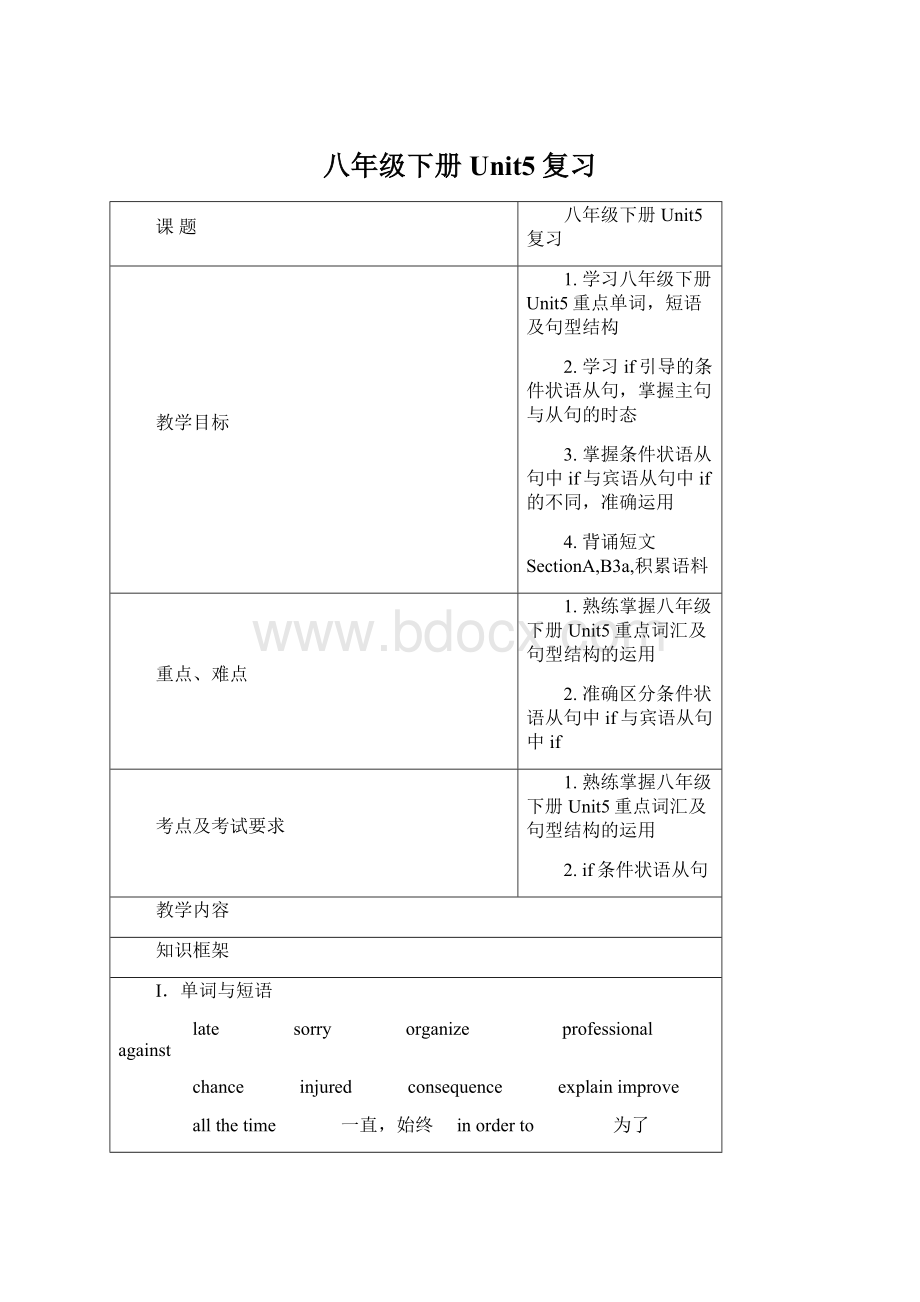 八年级下册Unit5复习.docx
八年级下册Unit5复习.docx
- 文档编号:8320340
- 上传时间:2023-01-30
- 格式:DOCX
- 页数:18
- 大小:28.25KB
八年级下册Unit5复习.docx
《八年级下册Unit5复习.docx》由会员分享,可在线阅读,更多相关《八年级下册Unit5复习.docx(18页珍藏版)》请在冰豆网上搜索。

八年级下册Unit5复习
课题
八年级下册Unit5复习
教学目标
1.学习八年级下册Unit5重点单词,短语及句型结构
2.学习if引导的条件状语从句,掌握主句与从句的时态
3.掌握条件状语从句中if与宾语从句中if的不同,准确运用
4.背诵短文SectionA,B3a,积累语料
重点、难点
1.熟练掌握八年级下册Unit5重点词汇及句型结构的运用
2.准确区分条件状语从句中if与宾语从句中if
考点及考试要求
1.熟练掌握八年级下册Unit5重点词汇及句型结构的运用
2.if条件状语从句
教学内容
知识框架
Ⅰ.单词与短语
late sorry organize professional against
chance injured consequence explainimprove
allthetime 一直,始终 inorderto 为了
haveaparty 举行聚会 gotocollege 上大学
befamousfor 因……而著称infact 事实上
laughat 嘲笑toomuch 太多
getexercise 锻炼travelaroundtheworld 周游世界
workhard 努力工作wearjeans 穿牛仔裤
getaneducation 获得教育
Ⅱ.Sentencestructures:
1.Ifyoudo,you’ll…2.I’mgoingto…
3.Youshould…4.Don’tyouwantto…?
5.Don’tyouthink…?
考点一:
Unit5基础复习
典型例题
单词:
组织(动)有组织的(形)花健康的
反对慈善团体机会运动员
真诚地律师今晚厨师
烹调伤害(动)受伤的
职业的业余的
短语:
让你进入穿牛仔服
乘公共汽车去…玩集会游戏
一半的学生学校集会的规则
带走它、它们要求某人(不)去做
带…去…带…来…
去上大学环游世界
赚许多钱受教育
好像,似乎
(2)全世界的人
一直做…谋生
(2)
受伤
知识概括、方法总结与易错点分析
重点难点分析
1.toomuch和muchtoo
toomuch后接不可数名词,用来表示数量太多,意思是“……太多了(数量多)”;muchtoo后接形容词,用来说明程度的,意思是“太……(程度深)”如:
muchtooheavy太重了(表程度)
错误:
Hehasdrunkmuchtoowater.
正确:
Hehasdrunktoomuchwater.他喝了太多的水。
(修饰不可数名词,表数量)
2.befamousfor和befamousas
befamousfor表示“因……而出名”,for后接表示出名的原因;befamousas则表示“以……身份而著名”,as后接职业、身份或地位,表示作为……职业、身份或地位是著名的,如:
Franceisfamousforitsfinefoodandwine.法国以其佳肴和美酒著名。
Franceisfamousasaromanticcountry.法国作为一个浪漫的国家而出名。
3.Iwantyoutoremembertherulesforschoolparties.
我想让你记住参加学校聚会的规则。
wantsb. todosth.想让某人做某事
4.travelaroundtheworld周游世界
e.g.HerdreamistotravelaroundChina. 她的梦想是周游全中国。
5.Ifwehaveittoday,halftheclasswon’tcome.
如果我们今天开聚会,全班有一半的同学将不来参加。
won’t是willnot的缩写
if从句用一般现在时,表示假设,主语用一般将来时。
6.reasonsforbecomingaprofessionalathlete 赞同成为一名职业运动员的理由
for prep.(表示赞成、支持),其反义词为against
eg.Areyouforhisplanoragainstit?
你是赞成还是反对他的计划?
Whichteamdidyouvotefor?
你投票给哪一个队(组)?
7.reasonsagainstbecomingaprofessionalathlete 反对成为一名职业运动员的理由。
against prep.反对,与…对抗
注意:
介词后面用名词或动词ing的形式
eg.Areyouagainstmyplan?
你反对我的计划吗?
OurplayedagainstNo.1MiddleSchoolatbasketballyesterday.我校和一中昨天比赛篮球。
8.beginthestory withthewords.以这些话开头讲这个故事。
begin…with…“以…开始(开头)”
eg.Thewordbeginswith“s”.这个词以“s”开头。
DoesheknowthatayearbeginswithJanuary?
9.consequence后果、结果
eg.Weshouldconsidertheconsequencesbeforedoing.
10.haveagreattime玩得高兴
11.takeaway运走,取走
eg.Don'ttakeitaway.I'lluseit. 不要将它拿走,我要用。
12.makealiving 谋生
eg.Hemakeslivingasadriver. 他以开车谋生。
13.makemoney 挣钱
eg.Afterhebecamefamous,hemadelotsofmoney.
14.letin允许……进入,嵌入
eg.Don’tletthebeggarin. 不要让那个乞丐进来。
Ⅴ.课文详解
1.Formanyyoungpeople,becomingaprofessionalathletemightseemlikeadreamjob.
对许多年青人来说,成为一名职业运动员可能似乎是一份理想的职业。
might(表示可能性,推测)
mightdo或许,说不定(一般表示比may较低的可能性)
eg.Shemightwintheprize.她或许会获得那个奖。
Thechildmightbehomealready.那孩子说不定已回家了。
seemlike+名词好像…,似乎…
e.g.Itseemslikeyearssincewelastmet.我们似乎好几年不见了。
2.You'llbeabletomakealivingdoingsomethingyoulove. 你能做你喜欢的事来谋生。
beableto+动词原形,“有能力做某事”
e.g.SheisabletolearnEnglishwell.她能学好英语。
Doingsomethingyoulove.做你喜爱的事。
youlove定语,修饰前面的something。
3.Peopleallovertheworldwillknowyou.全世界的人将会认识你。
allovertheworld作定语,修饰它前面的名词people。
4.Thisisagreatchancethatmanypeopledonothave.
这是一个许多人所不能得到的难得的机会。
thatmanypeopledonothave是一个定语从句,修饰它前面的chance。
great(表示程度,放在名词之前)非常的,异乎寻常的
eg.agreattalk健谈的人
Sheisagreatfriendofmine.她是我非常要好的朋友。
5.Watchyouallthetimeandfollowyoueverywhere.一直看着你,你走到哪都跟着你。
allthetime一直
eg.Look!
Themonkeysarerunningandjumpingallthetime.看,猴子们一直在跑在跳。
everywhere 副词(adv.)到处
I'velookedeverywhereforit.为了找它,我到处找了个遍。
Thedogfollowedhimeverywhere.无论在哪,那狗都跟着他。
6.getinjured=beinjured受伤
injured(adj)
eg.Hewasbadlyinjuredintheaccident.他在那次事故中受了重伤。
7.You'llhaveadifficulttimeknowingwhoyourrealfriendsare. 你将很难知道谁是你真正的朋友。
whoyourrealfriendsare是一个宾语从句,它作knowing一词的宾语,这是一种“特殊疑问词+陈述语序的”宾语从句。
e.g.Idon’tknowwhereheisfrom.我不知道他来自哪里。
特殊疑问词+陈述语序
Canyoutellmehowoldheis?
你能告诉我他多大吗?
howoldheis是宾语从句。
8.Ican’trememberhowtogettoyourhouse.我记不起来怎样去你家了。
howtogettoyourhouse是不定式作remember一词的宾语(此处不定式是指一个特殊疑问词+to+动词原形)
这个不定式短语可以用宾语从句来替换如下:
Ican’trememberhowIcangettoyourhouse.
E.g.CanyoutellmehowtogettoLuxunPark?
Weknowwhowewillask.
9.getenoughexercise得到充分的锻炼exercise名词,“锻炼”
10.gobackhome回到家,此句可以换成returnhome
11.laughatyou嘲笑你 laughatsib.嘲笑某人
E.g.Don’tlaughatapersonwhoisintrouble.
我们不要嘲笑陷于困境的人。
12.Howmanyaliensdyetheirhairbrown?
多少外星人把他们的头发染成棕色?
dye v.把…着色,染色
Shedyedherwhiteskirtgreen.她把白色裙子染成绿色的。
词语辨析
1.getto与arrive
getto与arrive均为“到达”之意。
①getto后面接名词,e.g.gettoShanghai/NewYork
但“到达这里/那里”则为gethere/getthere。
因为here和there为副词,所以它们前面不加to。
②arrive是不及物动词,它后面不能直接跟名词,必须与介词in/或at连用之后+名词。
e.g.TheyarrivedatJim’shouseat2p.m. (小地点之前用介词at)
WhendidtheyarriveinBeijing?
(大地点之前用介词in)
Ididn’tknowwhenhearrived. 我不知道他何时到达的。
此处arrived后面不需要宾语,故也不要加in或at。
“到达这里/那里”则改为arrivehere/there
“到家”则为”arrivehome”,因为here,there,home均为副词,所以不加in/at。
2.join和takepartin
join与takepartin均为“参加”之意,是动词
①但join后面跟一个组织,政党,社团,团体等,“参加并成为其中一名成员”
eg.jointheParty 入党jointheLeague入团
Shewantstojointhesingingclub.
另外,joinsb. 是“参加到某人的行列”之意
eg.Won’tyoujoinusinatennismatch?
你不想参加我们网球比赛吗?
Hejoinedusfordinner. 他与我们共进晚餐。
②takepartin(动词短语)指参加(某种活动)
eg.Areyougoingtotakepartinthediscussion?
你要参加讨论吗?
Hetookpartinthespeechcompetition?
他参加了演讲比赛。
DidtheytakepartinthatmeetinglastMonday?
他们上周一参加那次会了吗?
“花费”知多少?
——take,spend,cost&pay:
take、spend、pay、cost的用法:
spend的宾语通常是金钱或时间,句型:
sb.+(spend)+时间/金钱+onsth/(in)doingsth.;
take的主语通常是事情,句型:
sth./It+(take)+sb.+时间+todo…。
(如果是动作则常用it作形式主语将动词不定式后移);
cost的宾语通常是时间、金钱、力气,句型:
sth.+(cost)+sb.+时间/金钱/力气.;
pay的宾语通常是金钱,句型:
sb.+(pay)+金钱+for+事物.
如:
Shespentthewholenightreadingthenovel.(她花了一个晚上看那本小说)/Thisjobwilltakemetwodays.=Itwilltakemetwodaystodothejob.(做这件事情要花我两天的时间)/Howmuchdoesahouselikethiscost?
(像这样的房子要花多少钱?
)/Ipaidhimtwentydollarsforthebook..(我花了20元从他那儿买了书)
跟踪练习
1完成这项工作用了我3个小时。
____________________________________
2他用了30分钟写那封信。
____________________________________
3这台电视机花了他5000元.____________________________________
4做这项工作花了工人们很长的时间。
针对性练习
用所给词的适当形式填空。
1.Willyouhelpme____(make)thefood?
2.Whenisagoodtime____(have)theparty?
3.Ifhe____(walk)toschool,he’llbelate.
4.Ifhe____(have)enoughtimetomorrow,he____(meet)youinhisoffice.
5.It’scold.We’dbetterkeepthedoor____(close)
6.Youcanseemanybeautifulf___________inthegraden.
7.Whatwillh__________ifIdon’thaveanIDcard?
8.Willyouhelpmeo_________theparty,Jim?
.
9.It’saformalparty,pleasedon’twearj____.
10.Idon’twantthepen,pleasetakeita______.
11.Tom___________(organize)thepartylastnight.
12.Iwanttodosomework________(help)thepoorchildrenwhocan’tgotoschool.
13.LuXunwasa__________(fame)writerinChina.
14.Whydoyou______(laugh)atthepoorman?
15.Hemakesa________(live)asataxidriver.
单项选择
()1.—Didthey___________agreattimeyesterday?
—Yes.Theyenjoyed____.
A.have,themB.had,theyC.have,themselves
()2.You’dbetterlookupthenewwordinadictionary____youdon’tknowit.
A.ifB.whetherC.though
()3.Theyounggirlwantsto____jeanstotheparty.
A.putonB.dressC.wear
()4.Halftheclass____now.
A.singsB.issingingC.aresinging
()5.Thechildrenwillgotoparkifit____tomorrow.
A.isn’tsnowingB.won’tsnowC.doesn’tsnow
()1.Thevolleyballmatchwillbeputoffifit________.
A.willrain B.rains C.rained D.israined
()2.There________afootballgameonTVthisafternoon.
A.isgoingtohaveB.willbeC.isgoingtoplay D.willplay
()3.Thisworkis________formethanforyou.
A.difficultB.themostdifficult C.mostdifficult D.moredifficult
()4.I'llcatchupwithLucybeforeshe________thefinishingline.
A.reach B.isreaching C.reachesin D.willreach
()1.Willyougivehimachance(机会)____theimportantmeetingtomorrow.
A.totakepartinB.takepartinC.tojoin
()2.Whynot____yourteacherforhelpwhenyoucan’tfinish____itbyyourself?
A.ask,writeB.toask,writingC.ask,writing
()3.InBritain,youmustbe18____youwanttodriveacar.
A.becauseB.soC.if
()4.—Let’sgooutforapicnic(野餐)onSunday.—______.
A.NicetomeetyouB.GoodideaC.Thesametoyou
()5.Thegoodnewsmadeusvery____.
A.happyB.tobehappyC.happily
汉译英
1.IfIhavetime,Iwill__________________________________(周游世界).
2.Mydreamisto_____________________(上大学).
3.中国因为长城而闻名。
Chinais_________________theGreatWall.
4.我们应帮助那个穷孩子接受教育。
Weshouldhelpthepoorchild_______________________.
5.为了赚许多钱他努力地工作。
Heworkshardto_____________________.
考点二:
语法小结
典型例题
语法小结
1.if条件句
2.现在进行时表示将来的时间
一.if条件句
1.if条件句:
条件句用于陈述语气,表示假设的情况可能发生,其中if是“如果”的意思。
构成
条件从句
主句
时态
If+一般现在时
主语+shall/will+动词原形
例句
Ifhecomes,
hewilltakeustothezoo.
2.用法:
(1)条件状语从句通常由连词if引导,意为“如果、假如”,主句不能用begoingto表示将来,而应该用shall,will。
Ifyouleavenow,youarenevergoingtoregretit.(错误)
Ifyouleavenow,youwillneverregretit.(正确)
(2)if“如果”,引导条件状语从句,if从句则用一般现在时,主句用一般将来时。
如:
Ifitrainstomorrow,Ishan’
- 配套讲稿:
如PPT文件的首页显示word图标,表示该PPT已包含配套word讲稿。双击word图标可打开word文档。
- 特殊限制:
部分文档作品中含有的国旗、国徽等图片,仅作为作品整体效果示例展示,禁止商用。设计者仅对作品中独创性部分享有著作权。
- 关 键 词:
- 年级 下册 Unit5 复习
 冰豆网所有资源均是用户自行上传分享,仅供网友学习交流,未经上传用户书面授权,请勿作他用。
冰豆网所有资源均是用户自行上传分享,仅供网友学习交流,未经上传用户书面授权,请勿作他用。


 铝散热器项目年度预算报告.docx
铝散热器项目年度预算报告.docx
